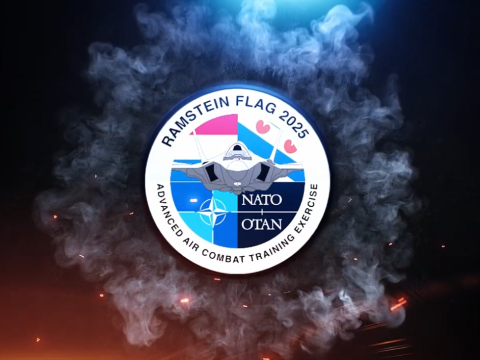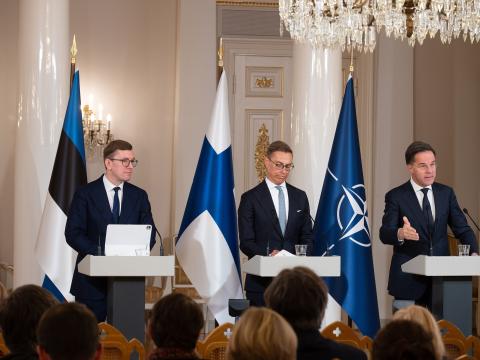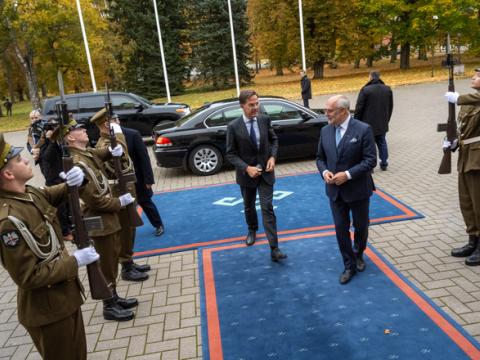President's Commentary: NATO Nations Need to Step Up
NATO must remain militarily strong to protect its flanks and the common interests of its members and like-minded partners.
As global security becomes more uncertain, NATO only grows in importance to its members. We’ve seen the repeated bad behavior of Russia, the continued chaos of the Middle East, the influence of Iran moving throughout the region and beyond, the increasingly bellicose activity of North Korea, and the ceaseless threat of ISIS all affecting NATO’s strategic interests. The alliance represents a unique set of international political and defense standards, values and norms that form the basis for rules-based order in Western civilization. Further, member nations underpin each other’s economies with dynamic trade and security. NATO must remain militarily strong to protect its flanks and the common interests of its members and like-minded partners.
The Atlantic alliance has been an enduring partnership for nearly seven decades. Yet it is easy to dismiss the importance of NATO because of frustrations with the repeated lack of financial commitment by some members and the slow pace of fielding critical capabilities needed by the alliance. Political rancor among members occasionally proves disruptive. But in the end, NATO has been an effective and viable military alliance for the free world. It is needed now more than ever, and steps must be taken to strengthen the alliance.
The challenges facing NATO are more consequential than they have been in decades. Because many members have yet to shoulder their agreed-upon financial share or meet prescribed funding targets, the resources needed to fully carry out NATO’s security mission are seriously lagging. Logistics, readiness and interoperability of capabilities remain operational and political challenges. These concerns are even more critical, given Russia’s escalating nefarious and threatening activity. Couple these worries with formal reports of dire readiness shortfalls among member nations, and one has a prescription for serious consequences.
Until now, only a handful of NATO nations have met the guideline adopted at the 2014 Wales summit: to devote 2 percent of their gross domestic product (GDP) to defense. Only a little more than half the nations—15 of 28 countries, excluding the United States—have a defense spending projection that will take them to the 2 percent agreement by the 2024 deadline. Whether 2 percent is a loosely defined “aim,” as written in the summit language, or more precisely a pledge, has become a warmly debated topic. Regardless, the word “aim” is a poor substitute for “commitment” in light of the re-emerging security threat from Russia, ISIS and others.
The United States far exceeds the 2 percent aim by spending about 3.3 percent of its GDP on defense, according to the CIA World Factbook. The political prestige, economic strength and military power of the United States have long been foundations of NATO success. Yet the United States is a global power with global responsibilities that extend well beyond the boundaries of NATO. China, Russia, Iran, ISIS and North Korea all challenge the United States and our partners’ interests.
Encumbered with a $20.7 trillion national debt and faced with challenges such as a rapidly emerging expansionist China, an unpredictable nuclear North Korea and expanding threats from Iran and ISIS, the United States must allocate its military resources thoughtfully across the full spectrum of its national interests. NATO should not expect the United States to disproportionately devote resources to the alliance when member nations fail to meet agreed-upon expectations. All NATO members need to step up and provide an increased capability in their own backyard—it is important to all of us for that to happen.
Readiness among NATO forces has suffered. That cannot be tolerated lest the alliance become what it was in the late 1970s—a hollow force with a critical mission. Many leaders, particularly those of former Warsaw Pact nations, are sounding the alarm over Russia’s menacing activities, but NATO ignores those warnings at its own peril.
NATO must show that it is a strong deterrent to anyone threatening its members. If that deterrent fails, then the alliance must be prepared to take on the threat directly. All 29 nations must step up now as if each one were the sole key to NATO success.




Comments